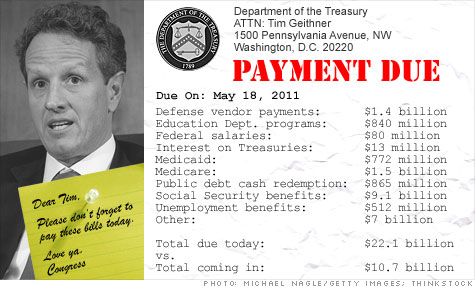At least he used to be...
Do you know how many times Chuck Schumer voted against raising the national debt ceiling?
If you answered "four times" to the question posed in the headline above, you are either spending way too much time in the Congressional Record, or you have superb research and recall skills! Let's just assume it's the latter.
Anyway, the right answer is indeed four times, at least. For the record, here's the four occasions, as documented by congressional records
H.R. 2015, Roll Call Vote #241: Passed 270-162, 6/25/97, Schumer Voted Nay
· H.J. Res. 51, Roll Call Vote #202: Passed 53-44, 5/23/03, Schumer Voted Nay
· S. 2986, Roll Call Vote #213: Passed 52-44, 11/17/04, Schumer Voted Nay
· H.J. Res. 47, Roll Call Vote #54: Passed 52-48, 3/16/06, Schumer Voted Nay
About which, Michael Steel, a key aide to House Speaker John Boehner observes:
Sen. Schumers voting record is like a dagger aimed at the heart of his own credibility. It is clear that the American people will not tolerate a blank check hike in the debt limit unless we deal with the real issue: out-of-control Washington spending. Were listening to the American people, but the Democrats who run Washington, led by Sen. Schumer, are not.
Read more at the Washington Examiner: Do you know how many times Chuck Schumer voted against raising the national debt ceiling? | Mark Tapscott | Beltway Confidential | Washington Examiner
Read more at the Washington Examiner: Do you know how many times Chuck Schumer voted against raising the national debt ceiling? | Mark Tapscott | Beltway Confidential | Washington Examiner

Do you know how many times Chuck Schumer voted against raising the national debt ceiling?
If you answered "four times" to the question posed in the headline above, you are either spending way too much time in the Congressional Record, or you have superb research and recall skills! Let's just assume it's the latter.
Anyway, the right answer is indeed four times, at least. For the record, here's the four occasions, as documented by congressional records
H.R. 2015, Roll Call Vote #241: Passed 270-162, 6/25/97, Schumer Voted Nay
· H.J. Res. 51, Roll Call Vote #202: Passed 53-44, 5/23/03, Schumer Voted Nay
· S. 2986, Roll Call Vote #213: Passed 52-44, 11/17/04, Schumer Voted Nay
· H.J. Res. 47, Roll Call Vote #54: Passed 52-48, 3/16/06, Schumer Voted Nay
About which, Michael Steel, a key aide to House Speaker John Boehner observes:
Sen. Schumers voting record is like a dagger aimed at the heart of his own credibility. It is clear that the American people will not tolerate a blank check hike in the debt limit unless we deal with the real issue: out-of-control Washington spending. Were listening to the American people, but the Democrats who run Washington, led by Sen. Schumer, are not.
Read more at the Washington Examiner: Do you know how many times Chuck Schumer voted against raising the national debt ceiling? | Mark Tapscott | Beltway Confidential | Washington Examiner
Read more at the Washington Examiner: Do you know how many times Chuck Schumer voted against raising the national debt ceiling? | Mark Tapscott | Beltway Confidential | Washington Examiner
